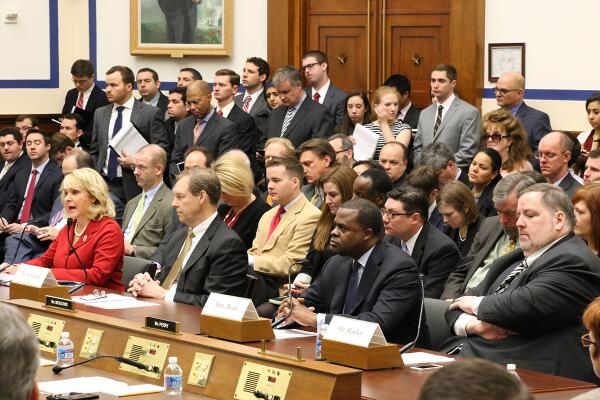
It's that time again. Just 18 months after the passage of the latest federal transportation bill, known as MAP-21, Congress has to get serious about the next one. The first hearing on the bill that will replace MAP-21 took place today in the House Transportation and Infrastructure Committee.
With gridlock the order of the day in Washington, expectations for sweeping policy reforms are low. This round of legislating will focus mainly on how to pay for the federal transportation program. The speakers today, who represented interests ranging from the construction lobby to transit unions, all stressed the need for greater certainty and pushed for a funding mechanism to support a long-term, six-year bill.
Members of the committee heard testimony from Oklahoma Governor Mary Fallin, Atlanta Mayor Kasim Reed, Stuart Levenick of industrial manufacturer Caterpillar, and Larry Hanley of the Amalgamated Transit Union. Those who testified even went so far as to suggest an outright funding crisis would be preferable to another series of short-term extensions, like the endless foot-dragging that preceded MAP-21, which itself lasted barely longer than an extension. A scenario where lawmakers let funding for transportation totally run out would at least add a sense of real urgency to negotiations, the thinking goes.
Wisconsin Congressman Tom Petri (R-Wisconsin) asked the panel which outcome they'd prefer, in the case of another stalemate between Republicans and Democrats in the House.
Reed responded, "I would err on the side of short-term pain."
Those who testified pressed for bold solutions, including alternatives to the gas tax. "What we need to do is have a conversation in this committee where we put all options on the table," said Reed.
Hanley suggested Congress consider a tax on financial transactions, the so called "Robin Hood" tax, to fund a 100 percent increase in transit funding, which he said was warranted by growth in major cities and young people's declining interest in driving.
Panel members reported being generally pleased with MAP-21. Reed reported that MAP-21's streamlined environmental regulations helped Atlanta deliver its under-construction streetcar on budget and close to on time.
Levenick was also positive about the legislation. "Many of the regulatory provisions [in MAP-21] would be very effective if applied to a longer term bill," he said.
Reed also took time to mention the success of TIGER, which has helped fund both the Atlanta Streetcar and the Beltline rail-trail system in that city. Atlanta recently received $18 million to support the Beltline project. That funding helped attract a further $43 million in private investment, he said.





